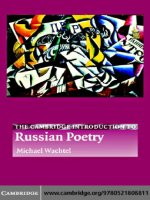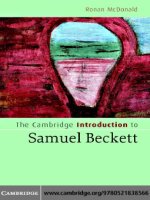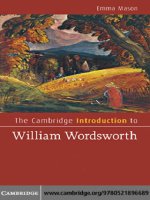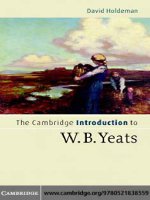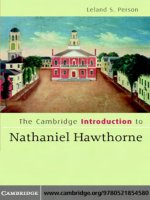the cambridge introduction to russian poetry
Bạn đang xem bản rút gọn của tài liệu. Xem và tải ngay bản đầy đủ của tài liệu tại đây (1.58 MB, 180 trang )
This page intentionally left blank
The Cambridge Introduction to
Russian Poetry
The Cambridge Introduction to Russian Poetry presents the major themes,
forms, genres, and styles of Russian poetry. Using examples from
Russia’s greatest poets, Michael Wachtel draws on three centuries of
verse, from the beginnings of secular literature in the eighteenth century
up to the present day. The first half of the book is devoted to concepts
such as versification, poetic language, and tradition; the second half is
organized along genre lines and examines the ode, the elegy, ballads, love
poetry, nature poetry, and patriotic verse. All poetry appears in the
original followed by literal translations. This book is designed to give
readers with even a minimal knowledge of the Russian language an
appreciation of the brilliance of Russian poetry. It will be an invaluable
tool for students and teachers alike.
michael wachtel is Professor in the Department of Slavic
Languages and Literatures at Princeton University. He is the author of
Russian Symbolism and Literary Tradition: Goethe, Novalis, and the Poetics of
Vyacheslav Ivanov (1994) and The Development of Russian Verse: Meter and
its Meanings (Cambridge, 1998).
The Cambridge Introduction to
Russian Poetry
MICHAEL WACHTEL
cambridge university press
Cambridge, New York, Melbourne, Madrid, Cape Town, Singapore, São Paulo
Cambridge University Press
The Edinburgh Building, Cambridge cb2 2ru, UK
First published in print format
isbn-13 978-0-521-80881-1
isbn-13 978-0-521-00493-0
isbn-13 978-0-511-21058-7
© Michael Wachtel 2004
2004
Information on this title: www.cambrid
g
e.or
g
/9780521808811
This publication is in copyright. Subject to statutory exception and to the provision of
relevant collective licensing agreements, no reproduction of any part may take place
without the written permission of Cambridge University Press.
isbn-10 0-511-21235-6
isbn-10 0-521-80881-2
isbn-10 0-521-00493-4
Cambridge University Press has no responsibility for the persistence or accuracy of urls
for external or third-party internet websites referred to in this publication, and does not
guarantee that any content on such websites is, or will remain, accurate or appropriate.
Published in the United States of America by Cambridge University Press, New York
www.cambridge.org
hardback
p
a
p
erback
p
a
p
erback
eBook (EBL)
eBook (EBL)
hardback
For Nathaniel and Benjamin Erasmus,
whose joy in language reminds me daily why poetry exists
Contents
Preface page ix
Acknowledgments x
Note on translations and transliterations xi
Introduction 1
Part I Concepts
Chapter 1 Versification: how to do things
with words
15
Meter 17
Rhyme 28
Stanza 30
Chapter 2 Poetic language 35
Lexicon 35
Sound 40
Tropes and syntax 44
Chapter 3 Tradition and the individual talent 50
Citation 52
Topos 57
Genre 60
vii
viii Contents
Part II Interpretation
Chapter 4 From the ode to the elegy (and beyond)
65
Chapter 5 The ballad 81
Chapter 6 Love poetry 95
Chapter 7 Nature poetry 110
Chapter 8 Patriotic verse 127
Conclusion: poetry and pattern 146
Bibliography 156
Suggested further reading 158
Index of poetic terms 160
Index of names and works 162
Preface
The achievements of Dostoevsky and Tolstoy notwithstanding, Russian lit-
erature is a tradition of poetry, not prose, and Russian readers have always
recognized it as such. This poetry has been poorly served in translation and
remains one of the great rewards for foreigners willing to invest the effort
in learning the language.
This book is not a history of Russian poetry, but rather a guide to reading,
interpreting, and appreciating it. The only prerequisite – beyond a healthy
intellectual curiosity – is a knowledge of the Russian language. How much
knowledge? The more, the better, of course, but even students who have
only completed their first year of study should be able to understand the
general principles and much of the textual analysis. The first part of the
book introduces fundamental concepts of poetic literacy, the things that any
educated reader (or poet) must know. In the second part, these concepts are
applied to the interpretation of specific poems, always set in the context of
other poems that share their formal qualities, themes, or genres. Students
without much prior exposure to poetry are urged to read the first section
in its entirety before beginning the second. Within the second section,
however, the chapters need not be read consecutively. From a linguistic
standpoint, Chapters Five, Six and Seven are probably the most accessible
(though it must be admitted that each concludes with a highly challenging
poem). More experienced readers should be able to orient themselves easily
and move immediately to the chapters that most interest them.
Throughout, I have included poems from a variety of styles and periods, in
most cases favoring recognized classics over lesser-known works. It seemed
appropriate that an introductory book should discuss some of the poems
that Russians themselves consider an essential part of their cultural identity.
However, broad coverage was not my primary concern. I hope that those
who first encounter Russian poetry in this book will be inspired to explore
further. (The bilingual anthologies listed in Section I of “Suggested further
reading” offer a convenient starting point.)
ix
Acknowledgments
The idea for this book came from Linda Bree, humanities editor at Cam-
bridge University Press, and I am grateful for her initial suggestion, her
subsequent encouragement, and her patience throughout.
Iamimmensely indebted to Caryl Emerson, Mikhail Gasparov, John
Malmstad, Barry Scherr, and Charles E. Townsend, all of whom scrutinized
early versions of the manuscript and gave numerous precise recommenda-
tions for its improvement. I also sincerely thank my students at Princeton
University – both graduate and undergraduate – who will recognize many
of the poems (and some of their own insights) in the pages that follow.
It may seem paradoxical that I have chosen to dedicate this book to my
children, who contributed primarily by delaying its composition. The real
hero, as always, is my wife, Anna, whose generosity and good humor warrant
much more than a dedication.
Farrar, Straus & Giroux Inc. and the Brodsky Estate have graciously
allowed me to cite Joseph Brodsky’s poem “. . . i pri slove ‘griadushchee’ ”
in its entirety in Russian and to use my own literal translation of it. Brod-
sky’s English rendering of the poem, highly interesting but too free for my
purposes, can be found in Joseph Brodsky, Collected Poems in English (New
York: Farrar, Straus & Giroux Inc., 2000), p. 114.
x
Note on translations and transliterations
To make the book maximally accessible, I have provided my own literal
translations of all Russian passages. Throughout, Russian poetry and poem
titles are given in cyrillic. Because Russian stress can be a source of perplexity
for students – and because rhythm is such an essential part of poetry – I mark
the stress in all Russian words (and even in proper names, when they first
appear in the “Introduction”). Where transliteration is necessary – usually
for individual words or phrases already cited in cyrillic – I use the system
that seems to me the most straightforward (essentially that found in Victor
Te r ras [ed.], A Handbook of Russian Literature,New Haven: Yale University
Press, 1985, p. xix). In the bibliography, I use the less readable but more
precise Library of Congress system.
If a poem has no title, I refer to it by its first line (or by the first words of that
line). For poems with titles, the English translation (as against the Russian)
will have all significant words capitalized (e.g., “Wave and Thought”). If
a Russian poem lacks a title and is named by its first line, the English
translation gives only the first word capitalized (e.g., “I loved you”). In most
of the translations, in order to save space, the graphic form of the original
has been altered, with the line breaks rendered by a single slash (/) and
stanza breaks by a double slash (//). Occasionally the Russian syntax makes
it impossible to retain the line breaks in English translation, in which case
only stanza breaks are indicated.
xi
Introduction
Поэ´т – издaлeкa´ зaво´дит рe´чь.
Поэ´тa – дaлeко´ зaво´дит рe´чь.
цвeтaeвa, «Поэ´ты»
The poet brings language from afar.
Language brings the poet far.
Tsvetaeva, “Poets”
When poets read their works aloud, we may not understand every word, but
we immediately recognize that their intonation differs from that of everyday
speech. This “unnatural” declamation often causes confusion among those
who first encounter it. “Why don’t they just read it normally?” one is tempted
to ask. The reason is simple: poets want to set their speech off from everyday
language. Individual poets vary widely in the degree of “unnaturalness” they
introduce to their readings, but in virtually all cases their goal is the same:
to destabilize the familiar world of their listeners, to make them hear anew.
All of us, poets or not, alter our tone of voice and choice of words in
accordance with specific circumstances. We speak differently with our par-
ents than with our peers, we address the auto mechanic differently than the
policeman, we speak differently when giving a toast than we do when calling
for an ambulance. In many life situations, what might be called the prosaic
attitude toward language dominates. Our object is to relay information as
quickly and unambiguously as possible. At other times, getting the point
across is not enough; it is essential to do so convincingly and fervently. We
select our words carefully and consciously organize them. In this case, we
are not necessarily creating poetry, but it is fair to say that we are moving
in the direction of poetry. It is no coincidence that most of the rhetorical
terms now associated with poetry originated in the law courts of antiquity.
The court is a place where eloquence matters, and the lawyers of ancient
Greece and Rome were trained in the art of persuasion.
Aprecise example may make it easier to distinguish between the poetic
and the prosaic poles. Readers who opened The New York Times on July 11,
2000 were greeted by the following article on the upper left-hand corner
of the first page.
1
2 Russian poetry
Thirty-five years after the dis-
mantling of legalized segregation,
a majority of Americans main-
tain that race relations in the
United States are generally good,
but blacks and whites continue to
have starkly divergent percep-
tions of many racial issues and
they remain largely isolated from
each other in their everyday lives,
according to a nationwide poll by
The New York Times.
Despite a superficial visual resemblance to verse, it is highly unlikely that
any of the countless readers confused this passage with poetry. No sane per-
son would stop to ponder why each line of this passage ends at the precise
point where it does. No one would ask questions like “Is the word ‘disman-
tling’ broken into ‘dis’ and ‘mantling’ to emphasize the concept of ‘break’?”
or: “Does the second line end on the word ‘segregation’ because this empha-
sizes a concept pivotal to the history of race relations in America?” We do
not ask such questions because, as experienced newspaper readers, we know
that the layout of individual lines is determined by printing necessity and
does not reflect the individual author’s intent. Likewise, no reader would
notice (let alone puzzle over) the unusual frequency with which the letters
“m” and “a” appear in adjacent positions in the first lines: mantling, majority,
Americans, maintain. We assume that the reporter’s primary goal is to con-
vey basic factual information. If certain combinations of letters recur, we
attribute this to coincidence, not to a conscious attempt to achieve some sort
of aural patterning. News writing is focused almost entirely on the message,
and whatever might distract from its direct and unambiguous presentation
is considered inappropriate.
In poetry, on the other hand, the presentation becomes part of the mes-
sage. Every aspect of the word (sound, spelling, placement on the page)
is potentially meaningful. If the newspaper writer aims for immediate and
unambiguous communication, the poet seeks to communicate in such a way
that the audience will want to read (or hear) again,sothat the individual
word becomes maximally expressive and the audience maximally alert to
that expression. For this reason, repeated encounters with the same poem
will deepen – and at times even contradict – the first impression, while
rereading a news item produces only tedium. This opposition between the
newspaper (with its immediate cognitive gratification) and poetry (with its
subtle interplay of sight and sound) is at the basis of Marina Tsvetaeva’s poem
«читa´тeли гaзe´т» (“Readers of Newspapers”), of which the opening lines
follow:
Introduction 3
Ползёт подзe´мный змe´й, The underground snake crawls,
Ползёт, вeзёт людe´й. [It] crawls [and] carries people.
и кa´ждый – со своe´й And each of them is with his
Гaзe´той (со своe´й Newspaper (with his
Экзe´мой!) жвa´чный ти´к, Eczema!) A chewing reflex,
Гaзe´тный костоe´д.Anewspaper bone-eater.
жeвa´тeли мaсти´к, Chewers of mastics,
читa´тeли гaзe´т. Readers of newspapers.
Tsvetaeva’s short lines mimic the effect of a newspaper column. However,
even a novice reader of poetry will recognize that the length of these lines is
not determined by coincidence or printers’ conventions, but by the poet’s
careful planning. If read aloud (and poetry should always be read aloud, if
only to oneself), it becomes evident that the end of each line is marked by
rhyme. This gives prominence to the final word of each line, which causes
the experienced reader to make a slight pause. Ordinarily, the end of a line
of poetry coincides with a logical break, usually reflected in the punctua-
tion (a comma or period). Tsvetaeva’s opening lines satisfy this expectation,
but already in lines three and four, the reader is torn between pausing at
the end of the line to emphasize the rhyme and rushing onwards to reach
the thought’s logical completion:
«и кa´ждый – со своe´й / Гaзe´той (со
своe
´й / Экзe´мой!)» – “And each of them is with his / Newspaper (with
his / Eczema!)” In this case, exact repetition at the end of the line helps
us to recognize the symmetry of what follows. Both lines conclude with
the same truncated prepositional phrase, leaving the object of the preposi-
tion to the beginning of the next line. These grammatically parallel words
(“Gazetoi” and “Ekzemoi” are both feminine nouns in the instrumental
case) are placed in graphically parallel positions. In everyday language, they
would rarely be used in the same sentence, but Tsvetaeva wants us to see
(and hear!) their similarities. In Russian, both words consist of three sylla-
bles, with a stress on the second. Moreover, they have a high percentage of
repeated sounds: “Gaze´toi” and “Ekze´moi” (according to rules of Russian
pronunciation, “k” before “z” is pronounced as “g”). Why does Tsvetaeva
do this? Presumably, she wants us to equate newspaper reading with disease
(a theme she develops in the lines that immediately follow). She establishes
this point indirectly, through rhyme and parallelism. By placing dissimilar
concepts in the identical position in the line, she emphasizes their similarity
in sound and suggests that they are related by sense. Our English translation
can preserve the word order but not the essential sound play.
Indeed, English translation proves wholly inadequate as early as the poem’s
first line. Rather than stating the setting directly, Tsvetaeva introduces the
image of a
«подзe´мный змe´й» (“underground snake”). Some ingenuity is
required to recognize this as a roundabout way of describing a subway. What
4 Russian poetry
has Tsvetaeva gained by this indirect locution (a metaphor, to use a term
we shall define later)? For one thing, she introduces a certain foreboding,
not simply because the subterranean realm (“podzemnyi”) is traditionally
associated with unclean things, death, and hell (all of which will be directly
relevant to this poem), but also because the snake (“zmei”) recalls the biblical
tale of the fall from Eden (which Tsvetaeva will allude to a few lines later
when she compares a newspaper to a fig leaf, punning on Russian
«лист»
as “leaf of paper” and “leaf of a tree”). No less important is the acous-
tic quality of these words. “Podzemnyi” not only shares its “po . . . ze”
with the previous word (“polzet”), but it also contains in anagrammatic
form every single letter found in the subsequent word (“zmei”). Thus, the
striking opening image is supported – perhaps even motivated – by the
sound.
Like so much of Tsvetaeva’s verse, this poem brims with linguistic inven-
tiveness. These few comments cannot begin to do it justice, but they allow us
to make some general observations on poetry. Tsvetaeva’s theme in “Readers
of Newspapers” is, on the surface, absolutely prosaic. (She is writing about
tabloids, the lowest form of journalism.) It is not the subject that makes
her work poetic, but rather her approach to that subject. By taking advan-
tage of the very sound of words, she introduces a coherence to language
that one would never find – or even seek – in a newspaper. The more
one ponders her specific images, the deeper their meaning becomes. For
example, the comparison of a subway to a snake could upon first glance
be understood simply in terms of their crawling motion. However, addi-
tional reflection (prompted by the knowledge of the entire poem) allows
one to see this as part of a carefully structured system of biblical refer-
ences, which in this poem range from Genesis to Revelation. For Tsve-
taeva, the newspaper is not simply the nemesis of poetry. It is poetry’s
demonic double, whose surface resemblance masks infernal designs. Such a
view appears to have been shared by other modern Russian poets: Vladislav
Khodasevich’s
«Гaзe´тчик» (“The Newspaper Vendor”) is based on a similar
assumption.
Whereas a newspaper concerns itself with current events, a poem tends to
focus on the general or even archetypal. However, the two forms differ less
in what they say than in how they say it. The effect of poetry depends on
the combination of a number of elements (concision, imagery, grammatical
parallelism, sound organization). It is this constant and complex interplay
that distinguishes poetry not simply from newspapers, but from virtually all
prose. While a novel or short story will undoubtedly reveal more careful
organization than a newspaper article, it will never achieve the concentration
and variety of patterning found in poetry.
Introduction 5
The present book is conceived of as an introduction to Russian poetry, not
a literary history. However, the task of introduction will be simplified if
the reader has at least a rough knowledge of who the leading poets were,
when they lived, and what “school” or “movement” they represented. The
following thumbnail sketch is intended to situate only those poets cited in
this book.
Compared to other national traditions, Russian poetry has a brief his-
tory. In the centuries when England enjoyed the creativity of Chaucer and
Shakespeare, when Germany and France celebrated a flowering of medieval
and baroque poetry, Russia’s muse was silent, at least as far as literate secular
culture was concerned. Epochal events like the Renaissance and Reforma-
tion left no trace on the Russian cultural consciousness. Even had a talent
of Shakespearean proportions arisen, three conditions would have conspired
against it: the lack of a literary language, the lack of a literate public, and the
overt hostility of church and state toward any form of artistic expression not
intimately linked to the liturgy. Among the people at large, various forms
of folklore existed, but these were independent oral traditions.
Peter the First (the Great), who ruled from 1689 to 1725, altered every
aspect of Russian life, including commerce, social interaction, the military,
education, and the arts. While there had been isolated attempts at West-
ernization under his immediate predecessors, no one could match Peter in
terms of energy and urgency. However, not all reforms could be imple-
mented as quickly as lopping the beard off a boyar. With typical impatience,
Peter built a theater on Red Square, succeeding in shocking centuries-old
religious sensibilities, but not in creating serious art. After all, the phys-
ical edifice alone could not compensate for the absence of a theatrical
tradition.
Peter’s reign was essentially a gestation period for Russian secular cul-
ture, which only came into its own after his death. A handful of ambitious
and talented individuals from the new educated class took it upon them-
selves to create Russian poetry. Most of these pioneers spent time abroad,
so their innovations tended to be adaptations of models they encountered
in Europe’s most advanced countries. However, historical and social cir-
cumstances specific to Russia also left their mark. Most obviously, Russian
poets were completely dependent on the patronage system. Without support
from the ruling institutions, nothing could be earned or published. These
institutions included the court and the Academy of Sciences (which was
itself controlled by the tsar). With the rare exception of men whose liveli-
hood was not dependent on their verse (e.g., Antiokh Kantemir [
Aнтио´х
Кaнтeми
´р], a professional diplomat whose work was not published in his
lifetime), poets were members of the Academy of Sciences and therefore
6 Russian poetry
essentially court employees. Their work consisted largely in writing odes
to commemorate specific occasions and praise the wisdom of the sovereign
and the valor of the military. The primary means of dissemination of verse
wasrecitation, which meant that poets gave considerable thought to perfor-
mance (public reading). Though continuous squabbling complicated their
task, Mikhailo Lomonosov [
Mихa´йло ломоно´сов] and Vasily Trediakovsky
[
Baси´лий Tрeдиaко´вский] achieved remarkable success in domesticating
poetry in Russia. In the course of a few decades, a genuine poetic tradition
was established, with erudite talents contributing both verse and treatises on
verse composition. If Lomonosov and Trediakovsky codified the poetic lan-
guage, more unorthodox talents toward the end of the century experimented
with it. These included Aleksandr Radishchev [
Aлeксa´ндр Paди´щeв] and,
in particular, Gavrila Derzhavin [
Гaври´лa дeржa´вин], the most inventive
and aesthetically significant poet of the century.
In the early decades of the nineteenth century, Russian poetry changed
direction. Poets emerged from the ranks of the aristocracy. Most served the
country in some capacity, but not as poets. State-sponsored poetry ceased
to exist, and the salon replaced the court as the primary venue. Instead of
an audience of rulers and high-ranking nobles, poets wrote for their peers
and, especially, for their friends. Accordingly, the themes of poetry now
concentrated on the personal (friendship, longing, love) rather than the civic.
Even the language of poetry changed. Influenced by the French-flavored
Russian of Nikolai Karamzin [
Hиколa´йКaрaмзи´н], poetry sounded much
closer to the spoken idiom than it had in the previous century.
The first few decades of the nineteenth century are traditionally
considered Russia’s “Golden Age.” Ushered in by the Italophile Kon-
stantin Batiushkov [
Констaнти´нБa´тюшков] and the Germanophile Vasily
Zhukovsky [
Baси´лий жуко´вский], it reached its apogee in Aleksandr
Pushkin [
Aлeксa´ндр Пу´шкин], who seamlessly adapted the innovations
of his predecessors and added his own. Pushkin brought his “Midas touch”
to everything he wrote, from epigrammatic insult to religious verse, from
love poem to fairy tale, from comedy to tragedy. His works, characterized by
a surface clarity that often masks their profundity, set the standard for con-
temporaries and successors. Most of the other major poets of the time were
Pushkin’s friends. Nikolai Iazykov [
Hиколa´йЯзы´ков], who made a name
for himself singing the carefree joys of student life, later devoted his poetry to
nationalistic themes and conservative causes. Evgenii Baratynsky [
Eвгe´ний
Бaрaты
´нский], the only contemporary poet who could rival Pushkin, began
as a follower of Batiushkov, but developed a distinctly brooding tone and a
complicated syntax and language unique in his day. Petr Viazemsky [
Пётр
Bя
´зeмский], who outlived all of his friends and grew increasingly stodgy
Introduction 7
and conservative, was in his youth a free-thinker and poet of great wit and
irreverence.
After Pushkin’s death, Russian poetry enjoyed a final brief outburst of
creativity in Mikhail Lermontov [
Mихaи´л лe´рмонтов], a Romantic in
the Byronic mode, whose powerful, uncompromising, and always dissatis-
fied persona dominated his verse. After Lermontov’s death, Russian poetry
went into relative decline. It was not so much that great poets ceased to
exist as that the sudden emergence of prose made poets less numerous and
poetic interaction less animated. The greatest flowering of Russian poetry
has always occurred in eras when numerous excellent poets are at work
together, spurring each other on. In the decades following Pushkin’s death,
the handful of outstanding poets worked more or less independently. Fedor
Tiutchev [
ёдор Tю´тчeв], whose early poems were published in a journal
that Pushkin himself edited, was a diplomat. He wrote poetry primarily
for himself, took little interest in whether it was actually published, and
at one point inadvertently destroyed a stack of his own manuscripts, in
one stroke depriving posterity of some of the century’s potentially finest
verse. If Lermontov represented the Romantic cult of the poetic personal-
ity, Tiutchev followed the more speculative side of Romanticism. Afanasy
Fet [
Aфaнa´сий eт], whose “art for art’s sake” credo alienated him from
the socially engaged critics of his time, withdrew to his estate, refraining for
decades from publishing his introspective and innovative verse. Only Nikolai
Nekrasov’s [
Hиколa´й Heкрa´сов] poetry really fit in with the spirit of the
times; in his work, the plight of the masses gets expression, often in satiric
or folkloric style.
The last years of the nineteenth century marked a rebirth of interest in
poetry and the dawn of Russia’s “Silver Age” (as the period from the 1890s to
the early 1920s has come to be known). The term is somewhat misleading,
since in quantity of excellent poets and quality of work the “Silver Age” is
not inferior to the “Golden Age.” The first phase of the “Silver Age” saw
the ascent of Russian Symbolism. After Valery Briusov’s [
Baлe´рий Брю´сов]
adaptations of European Decadence, Symbolism soon took a strong religious
turn in the works of Zinaida Gippius [
зинaи´дa Ги´ппиус]. Building on
Vladimir Soloviev’s [
Bлaди´мир Cоловьёв] philosophy and mystical poetry,
the influential triumvirate of Aleksandr Blok [
Aлeксa´ндр Блок], Andrei
Bely [
Aндрe´йБe´лый], and Vyacheslav Ivanov [Bячeслa´в ивa´нов] sought
to redefine the goals of art. Consciously fusing myth and religion with
aesthetics, they saw poetry as a means of transcending the physical world and
achieving knowledge of a mysterious other world. Blok began as a love poet,
but later turned his attention to urban and civic themes. Bely, an inveterate
experimenter, explored almost every aspect of verse language in works that
8 Russian poetry
ranged from the confessional to Nekrasov-like folk stylizations. For Ivanov,
whose fascination with antiquity affected both the texture of his verse and
its themes, poetics meant mythopoetics, with personal and contemporary
themes always submerged in the timeless and selfless world of myth. The
Symbolists’ contributions went beyond the writing of verse, for they were
untiring educators and proselytizers. Through translations, public lectures,
and personal example, they raised public consciousness about art. Though
not a Symbolist, Mikhail Kuzmin [
Mихaи´лКузми´н] had similarly wide-
ranging talents and interests: his poetry ranges from the precise miniature
to the mystical and hermetic.
The Symbolists continued to write for decades, but the movement as such
more or less collapsed in 1910. At this point, many new schools appeared,
the two most significant being Acmeism and Futurism. Acmeism was a
neo-classical form of modernism, which purported to reject the excessive
mysticism of Symbolism and replace it with a new ideal of clarity. In many
respects, however, the Acmeists were a logical extension of the Symbolists,
with their emphasis on poetic craft and cultural continuity. Acmeism left
its mark on Russian poetry less as a unified movement than through the
achievements of its two greatest poets: Anna Akhmatova [
´
A
ннa Aхмa´товa]
and Osip Mandel
shtam [
´
Oсип Maндeльштa´м]. Perhaps even less unified
than Acmeism, Futurism sought to provoke and outrage. If the Symbolists
and Acmeists revered the past, the Futurists – at least the Cubo-Futurists,
who represented the most extreme of several Futurist camps – claimed
to reject it entirely. In its place, they proposed either a neo-primitivism
(which sought its linguistic ideal in a historically nonexistent form of early
Slavdom) or a cult of the new technology (machines, speed). The former was
represented by the eccentric Aleksei Kruchenykh [
Aлeксe´йКручёных] and
visionary Velimir Khlebnikov [
Beлими´р Xлe´бников], the latter by Vladimir
Mayakovsky [
Bлaди´мир Maяко´вский]. Arguing that radical poetics went
hand in hand with radical politics, Mayakovsky greeted the Revolution with
open arms and became one of the most visible apologists for the Soviet
regime. His influence, which waned toward the end of his life and for a few
years after his suicide in 1930, ultimately proved decisive through the entire
Soviet period.
Tw oofRussia’s most outstanding poets emerged from the ferment of the
pre-revolutionary years without belonging to any “school.” Boris Paster-
nak [
Бори´сПaстeрнa´к] began his career close to one of the more docile
Futurist factions, but soon became a poet without an “ism.” Marina Tsve-
taeva’s [
Maри´нa цвeтa´eвa] poetry reflects the influence of Cubo-Futurism,
but she herself never joined this or any other movement. Both Pasternak
and Tsvetaeva synthesized the most compelling aspects of many rival
groups, creating exuberant yet profound poetry with linguistic brilliance and
Introduction 9
extraordinary emotional range. Their works are among the most challeng-
ing, but also the most rewarding in the entire Russian tradition.
The Russian revolution was a watershed event not only in terms of
politics, but also in the cultural sphere. If Russian visual artists and musi-
cians could easily continue their careers in emigration, poets found them-
selves choosing between highly undesirable alternatives. Many emigrated,
only to live unhappy and often creatively unproductive lives in coun-
tries that could not appreciate them. In Paris, the capital of the Russian
emigration, Vladislav Khodasevich [
Bлaдислa´в Xодaсe´вич] and Georgy
Ivanov [
Гeо´ргий ивa´нов]provided bleak but powerful poetic voices. Oth-
ers remained in a Russia they distrusted, often with tragic professional and
personal consequences. Akhmatova endured years of persecution, while
Mandel
shtam was arrested twice and perished on his way to a Stalinist
labor camp. Tsvetaeva combined the worst of both fates, spending bitter
years asane´migre´, only to return to Russia, where, obscure and destitute,
she committed suicide.
The Soviet regime valued culture insofar as it could inspire loyalty to
the party. A new patronage system arose, with the party leaders standing
in for the tsars and the ever more powerful Writers’ Union playing the role
that the Academy of Sciences had played in the eighteenth century. How-
ever, the stakes were even higher, since a poem that misinterpreted the often
inscrutable party line could result in a stiff prison sentence or worse. As in
the eighteenth century, panegyric genres were favored. With the exception
of Mayakovsky’s work, little of the reams of officially published poetry is
worthy of serious attention. On the other hand, a rich tradition of unof-
ficial poetry emerged in the relative freedom after Stalin’s death. In the
1960s, Evgeny Evtushenko [
Eвгe´ний Eвтушe´нко]tried to resurrect the tri-
bune that Mayakovsky had established, filling stadiums with crowds who
came to hear his daring, if somewhat compromised (both poetically and
politically) verse. More influential, perhaps, was the quiet revolution of the
bards, genuine non-conformists who sang their verse, accompanying their
unschooled voices on the traditional Russian seven-string guitar. Of these,
Bulat Okudzhava’s [
Булa´т Oкуджa´вa] plaintive lyrics were among the most
celebrated. Though never officially produced, cassette recordings of the
bards’ work spread throughout the country, making it known far and wide.
Va r ious non-conformist poetry movements also took shape in the 1960s and
1970s, ranging from avant-garde experimenters like Nina Iskrenko [
Hи´нa
искрe´нко], who embraced a diverse panoply of styles (“polystylistics”),
to conceptualist poets like Dimitri Prigov [
дми´трий При´гов] and Timur
Kibirov [
Tиму´рКиби´ров], who questioned the validity of all previous dis-
course (especially the official Soviet language). Finally, some poets built on
the legacy of the officially repudiated “Silver Age,” celebrating the richness
10 Russian poetry
and variety of pre-revolutionary poetry. Though a member of the Writers’
Union, Viktor Sosnora [
Bи´ктор Cосно´рa]wrote on unorthodox themes in
unorthodox style, revitalizing Futurist experiments with language. A com-
plete outsider to the system, Joseph Brodsky [
ио´сиф Бро´дский]created a
richly allusive poetics, combining high and low genres and styles. After his
forced emigration, he tried tirelessly to inculcate his reverence of tradition
to American audiences through interviews, readings, and translations, as
well as in the capacity of university professor, American poet laureate, and
Nobel prize winner.
By the time of Brodsky’s death in 1996, Russian culture had experienced
perhaps the most decisive paradigm shift in its entire history. For an out-
sider, it is difficult to appreciate the extent to which the demise of the USSR
altered the landscape of Russian poetry. On the one hand, poets experienced
an unprecedented sense of freedom. For the first time in Russian history,
censorship was abolished. For the first time in living memory, poets could
write without giving a thought to political expediency, without depending
on the state as the sole sponsor and publisher of literature. On the other
hand, a rich culture of secrecy was demolished in a single stroke. Through
threats, admonishments, punishments, and rewards, the Soviet Union had
granted the poet an exalted place in society. Evtushenko, who fully appre-
ciated this status, had been right on the mark when he entitled one of
his books A Poet in Russia Is More Than a Poet (1973). The “system” cre-
ated no shortage of sycophants, but it also gave birth to non-conformist
poets as well as a colorful vocabulary to describe their subversive activi-
ties:
«спи´ски» (copies of unofficial verse which circulated among the con-
spiratorial cognoscenti),
«сaмиздa´т» (the system of unofficial publication
[typewriter and carbon paper being the primary means of reproduction]),
«эзо´пов язы´к» (Aesopian language, needed to express the truth in a fashion
sufficiently obscure to sneak it past the censor),
«писa´ть в стол» (“to write
for the desk drawer,” the term for work so critical that it could only be put
in a folder to await publication in some distant era). The dissident poet was
an extremely appealing figure, and the attendant mythology helped make
him (or her) a cultural hero unimaginable in the West.
In a society that controlled all sources of information, people looked to
literature as a secret source of wisdom and a moral compass. With the fall
of the Soviet Union, the familiar and accepted roles of poet as martyr or
poet as prophet lost their relevance. If the non-conformist Soviet poet had
to outwit the increasingly clumsy totalitarian system, the post-Soviet poet
has to contend with new adversaries, more mundane, but no less powerful.
As entertainment, poetry now competes with Harlequin romances, televi-
sion sit-coms, and Hollywood-style films. As social commentary, it has lost
considerable ground to the news media. While many bemoan this turn of
Introduction 11
events, Westerners recognize it as the inevitable fate of the modern poet.
At the present time, poetry in Russia is probably no more prominent a cul-
tural force than it is in English-speaking countries, yet the relatively small
readership remains as devoted and educated as anywhere in the world. And
Russian poets have proved resilient, responding to new challenges with wit
and imagination.



